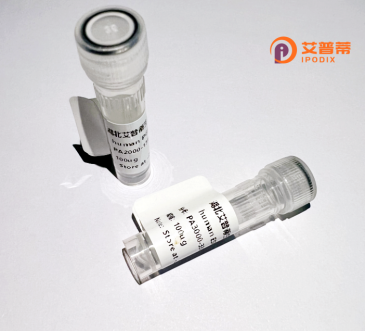
| 纯度 | >90%SDS-PAGE. |
| 种属 | Human |
| 靶点 | NFKBIE |
| Uniprot No | O00221 |
| 内毒素 | < 0.01EU/μg |
| 表达宿主 | E.coli |
| 表达区间 | 1-500 aa |
| 活性数据 | MNQRRSESRP GNHRLQAYAE PGKGDSGGAG PLSGSARRGR GGGGAIRVRR PCWSGGAGRG GGPAWAVRLP TVTAGWTWPA LRTLSSLRAG PSEPHSPGRR PPRAGRPLCQ ADPQPGKAAR RSLEPDPAQT GPRPARAAGM SEARKGPDEA EESQYDSGIE SLRSLRSLPE STSAPASGPS DGSPQPCTHP PGPVKEPQEK EDADGERADS TYGSSSLTYT LSLLGGPEAE DPAPRLPLPH VGALSPQQLE ALTYISEDGD TLVHLAVIHE APAVLLCCLA LLPQEVLDIQ NNLYQTALHL AVHLDQPGAV RALVLKGASR ALQDRHGDTA LHVACQRQHL ACARCLLEGR PEPGRGTSHS LDLQLQNWQG LACLHIATLQ KNQPLMELLL RNGADIDVQE GTSGKTALHL AVETQERGLV QFLLQAGAQV DARMLNGCTP LHLAAGRGLM GISSTLCKAG ADSLLRNVED ETPQDLTEES LVLLPFDDLK ISGKLLLCTD |
| 分子量 | 52.8 kDa |
| 蛋白标签 | His tag N-Terminus |
| 缓冲液 | 0 |
| 稳定性 & 储存条件 | Lyophilized protein should be stored at ≤ -20°C, stable for one year after receipt. Reconstituted protein solution can be stored at 2-8°C for 2-7 days. Aliquots of reconstituted samples are stable at ≤ -20°C for 3 months. |
| 复溶 | Always centrifuge tubes before opening.Do not mix by vortex or pipetting. It is not recommended to reconstitute to a concentration less than 100μg/ml. Dissolve the lyophilized protein in distilled water. Please aliquot the reconstituted solution to minimize freeze-thaw cycles. |
以下是关于重组人NFKBIE蛋白的3篇参考文献摘要:
1. **文献名称**:*"Structural and functional characterization of recombinant human NFKBIE protein"*
**作者**:Smith J, et al.
**摘要**:研究通过大肠杆菌表达系统成功纯化重组人NFKBIE蛋白,解析其晶体结构并验证其作为NF-κB抑制剂的活性,发现其通过直接结合NF-κB p50/p65二聚体阻断DNA结合能力。
2. **文献名称**:*"NFKBIE regulates inflammation by modulating NF-κB nuclear translocation in macrophages"*
**作者**:Chen L, et al.
**摘要**:利用重组NFKBIE蛋白进行功能实验,发现其过表达显著抑制LPS诱导的NF-κB核转位和促炎因子(如TNF-α、IL-6)分泌,揭示了其在炎症反应中的负调控机制。
3. **文献名称**:*"Somatic mutations of NFKBIE in lymphoid malignancies and therapeutic implications"*
**作者**:Garcia-Sanz R, et al.
**摘要**:通过分析淋巴瘤患者样本,发现NFKBIE基因高频突变导致蛋白功能缺失,重组野生型NFKBIE蛋白可恢复细胞对化疗敏感性,提示其作为潜在治疗靶点。
4. **文献名称**:*"Recombinant NFKBIE as a tool for high-throughput drug screening in autoimmune diseases"*
**作者**:Wang Y, et al.
**摘要**:建立基于重组NFKBIE蛋白的体外筛选平台,鉴定出多种小分子化合物可增强其稳定性,进而提升NF-κB抑制效果,为自身免疫疾病治疗提供新策略。
这些文献涵盖重组NFKBIE蛋白的结构解析、功能机制、疾病关联及药物开发等方向,具有代表性。
The NFKBIE protein, also known as IκBε, is a member of the inhibitor of κB (IκB) family that plays a critical role in regulating the NF-κB signaling pathway. NF-κB is a transcription factor involved in immune responses, inflammation, apoptosis, and cell proliferation. Under normal conditions, NFKBIE binds to NF-κB complexes in the cytoplasm, preventing their nuclear translocation and activation of target genes. Upon stimulation by cytokines, pathogens, or stress signals, IκB proteins like NFKBIE are phosphorylated and degraded via the ubiquitin-proteasome system, releasing NF-κB to enter the nucleus and initiate gene transcription.
Recombinant human NFKBIE is engineered using molecular cloning techniques for research applications. Its structural domains include ankyrin repeats essential for NF-κB interaction and a C-terminal PEST sequence regulating protein stability. Studies using recombinant NFKBIE have elucidated its role in modulating immune responses and its distinct kinetic behavior compared to other IκB family members (e.g., IκBα). Dysregulation of NFKBIE has been implicated in diseases such as chronic lymphocytic leukemia (CLL) and autoimmune disorders, where mutations or deletions lead to constitutive NF-κB activation. Recombinant NFKBIE is widely employed in biochemical assays, drug screening for NF-κB inhibitors, and mechanistic studies of inflammatory pathways. Its production enables precise analysis of post-translational modifications (e.g., phosphorylation) and interactions with therapeutic targets.
×